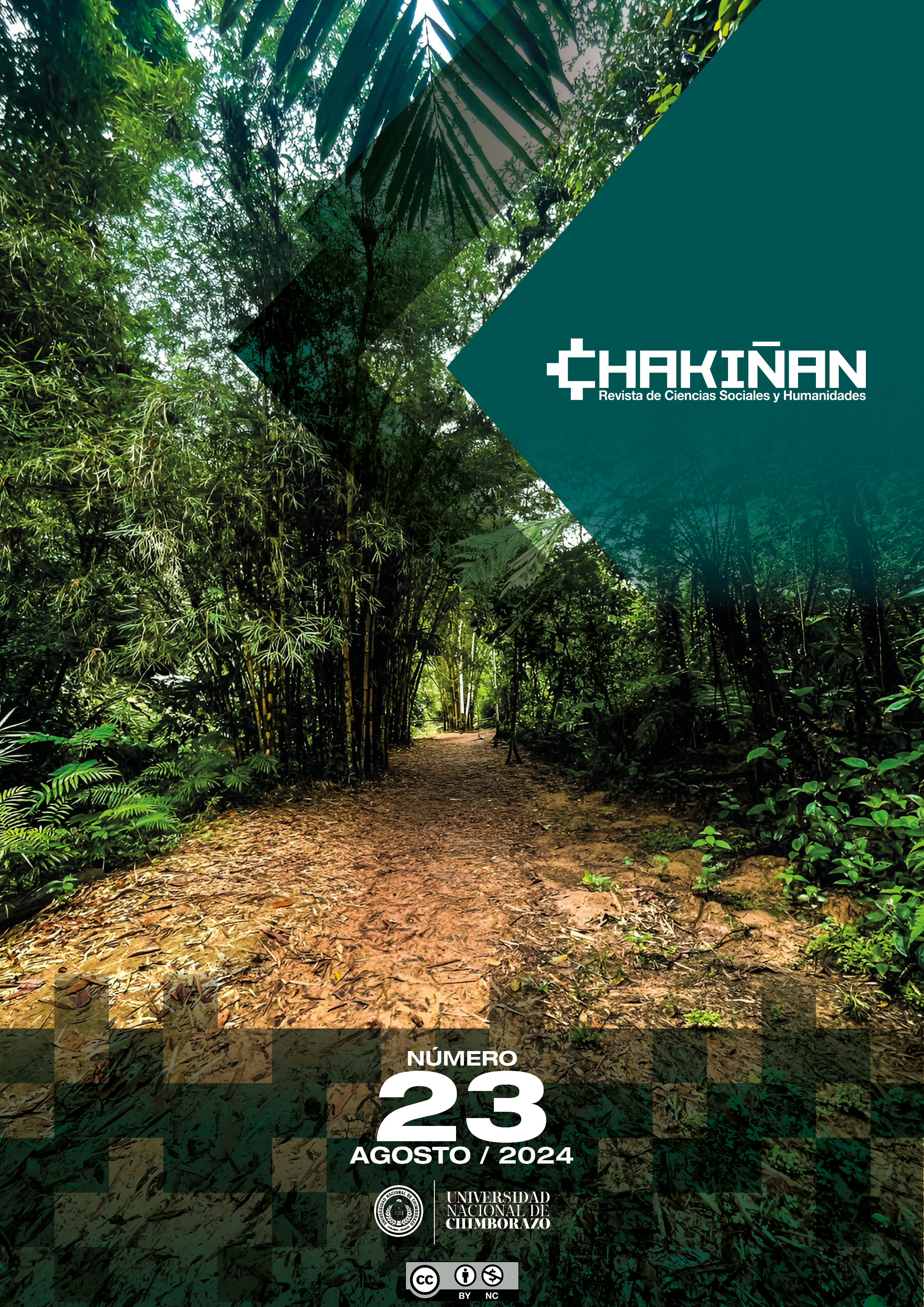IRRUPTION TO KICHWA LANGUAGE IN ECUADORIAN UNIVERSITIES
Main Article Content
Abstract
The text proposes to analyze the irruption of Kichwa in some universities of Ecuador, through the qualitative paradigm; considering that the Kichwa language has been historically excluded from the academies under the concept of yanka shimi (language without prestige). A language underestimated for several centuries; currently, it has a place in the Political Constitution of Ecuador and in some universities of the country, either as a subject, publications in scientific journals, creation of postgraduate courses sporadically, training courses in public and private universities, publications of books and book chapters. Therefore, the operation of kichwa in university spaces does not move in a peaceful field, but in a field of constant dispute. The research method used was hermeneutic due to the multidisciplinary interpretation of primary and secondary sources. The relevant conclusions suggest: a) the emergence of kichwa in some universities of the country; b) the irruption of kichwa in academic spaces is not a peaceful field but a field of struggle; c) despite the legal and academic recognition of the language, there are still many concrete actions, for example, the creation of doctoral programs to forge rigorous and original research; d) kichwa, historically, has been wielded as a strategy of insurgency, but also of multiple dialogues.
Downloads
Article Details
Conference Proceedings Volume
Section

This work is licensed under a Creative Commons Attribution-NonCommercial 4.0 International License.
Responsibility of the authors:
The authors are responsible for the ideas and data collected in the manuscripts. They are additionally accountable for the fidelity of the information, the correction of the citations, the right to publish any material included in the text, and the presentation of the manuscript in the format required by the Journal (WORD template). A manuscript forwarded to CHAKIÑAN must not have been published before, nor must it have been submitted to another means of publication.
Copyright:
Published articles do not necessarily compromise the viewpoint of the CHAKIÑAN JOURNAL. The Journal is aligned to the policy of the licence de Creative Commons Reconocimiento-No comercial 4.0 Internacional (CC BY-NC 4.0). Each author retains the right to the paper published in the Chakiñan journal.
Privacy statement
The personal data and email addresses entered in this magazine will be used exclusively for the purposes stated by the publication and will not be available for any other purpose or person.
How to Cite
Share
References
De Sousa, S. (2008). Conocer desde el sur. Para una cultura política emancipatoria. CLACSO.
Dietz, G., & Álvarez, A. (2014). Reflexividad, interpretación y colaboración en etnografía: un ejemplo desde la antropología de la educación. En C. Oehmichen (Ed.), La etnografía y el trabajo de campo en las ciencias sociales (pp. 55-90). Universidad Nacional Autónoma de México.
Foucault, M. (1996). Genealogía del racismo. Siglo XXI.
Foucault, M. (2013). En defensa de la sociedad. Siglo XXI.
Fuller, N. (2002). Interculturalidad y política: desafíos y posibilidades. Red para el Desarrollo de las Ciencias Sociales en el Perú. https://repositorio.up.edu.pe/handle/11354/137
Garcés, F. (2009). ¿Colonialidad o interculturalidad? Representaciones de la lengua y el conocimiento quechuas. Universidad Andina Simón Bolívar.
García, F. (2008). Maestría en Ciencias Sociales con especialidad en Estudios Étnicos para profesionales indígenas latinoamericanos: una experiencia intercultural. FLACSO. https://n9.cl/3ltk0
Grosfoguel, R. (2012). El concepto de racismo en Michel Foucault y Frantz Fanon: ¿teorizar desde la zona del ser o desde la zona del no-ser? Tabula Rasa, (16), 79-102. https://n9.cl/ykxti
Hernández, S. (2016). Los diversos sentidos de lo intercultural en las experiencias de educación superior. En M. V. Di Caudo (Coord.), Interculturalidad y educación desde el sur. Contextos, experiencias y voces (pp. 159-192). Abya-Yala.
Macas, L. (2001). ¿Cómo se forjó la Universidad Intercultural? En P. Dávalos (Ed.), Yuyarinakuy: “digamos lo que somos, antes que otros nos den diciendo lo que no somos”; una minga de ideas (pp. 106-108). Abya Yala. https://n9.cl/mf5ha
Mato, D. (2015). Educación Superior y Pueblos Indígenas en América Latina. Universidad Nacional de Tres de Febrero.
Montaluisa, L. (2019). La estandarización ortográfica del quichua ecuatoriano. Consideraciones históricas, dialectológicas y sociolinguisticas. Abya-Yala.
Muratorio, B. (1982). Imágenes e imagineros. Flacso.
Negri, A. & Hardt, M. (2000). Imperio. Paidós.
Ortiz, G. (2001). El quichua en el Ecuador. Ensayo histórico-lingüístico. Abya-Yala.
Roseberry, W. (2007) Hegemonía y el lenguaje de la controversia. En M. Lagos (Coord.), Antropología el Estado: Dominación y prácticas contestatarias en América Latina (pp. 40-117). Cuaderno de Futuro.
Scott, J. (2007). Los dominados y el arte de la resistencia. Ediciones Era.
Tambaco, K., & Floyd, S. (2022). Reflexiones sobre la enseñanza del kichwa en el contexto conteporaneo. En F. Garcés & A. Muyolema (Coords.), Oralidades y escrituras kichwas (pp. 101-117). Universidad Politécnica Salesiana.
Uzendoski, M., & Alvarado, C. (2022). Oralidad y escritura en killa kawsay yachaymanta rimay (cuillurkuna). En F. Garcés & A. Muyolema (Coords), Oralidades y escrituras kichwas (pp. 61-79). Universidad Politécnica Salesiana.






